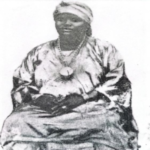LIBEN-AMDIE, MANAN
- 2 Min Read
Empress Manan (circa 1800-1850s), or Manan Liben-Amdié, was the mother of Ras Ali Alula, and the wife of Yohannes III (reigned 1840-55).
Born of a Muslim family of Wara Himano in northern Shawa, she accepted Christianity, and through her marriage with Alula Gugsa, a powerful Galla leader, became the link between her own relatives in the Muslim nobility of Wallo and Wara Himano provinces, and the Christianised members of the Yaju Galla dynasty of Wallo, and their supporters. After her son Ali, at the age of 13, had been elected Ras of Bagemder and Amhara, and became guardian of the emperor (then a mere puppet), in 1831, her influence and power grew steadily.
In 1840 she received the provinces north and west of Lake Tana as her own territory. She then married a member of the Solomonic dynasty, deposed the puppet emperor, Sahela Dengel, and had her husband crowned as Yohannes III, and herself empress. After a few years, her rule as empress was challenged by a young warrior and district governor named Kassa, later to become Emperor Téwodros II.
When her officers failed to catch the rebel, she took personal command of her forces, and took the field against him. She was, however, heavily defeated at a battle on the plains of Takussa, northwest of Lake Tana, in June 1847. After some months of captivity, she was released, but had to surrender her territory to Téwodros, and lost her political influence.
Empress Manan’s reputation in Ethiopian tradition and among contemporary foreign observers is that of a proud and powerful woman, and an ambitious and ruthless politician. The French traveller Arnauld d’Abbadie summed up her character as follows: “Greedy, miserly, crafty, violent, ambitious, despotic, vain, and coquettish, she would not shrink from any means.”
SVEN RUBENSON



